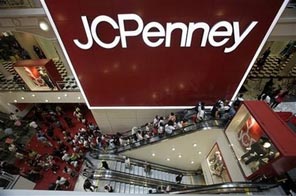Penney posts small 2Q loss, raises profit outlook
NEW YORK: Cutting inventory and other costs helped J.C. Penney Co. post a smaller loss for the second quarter than Wall Street expected, but the moderate-price department store chain expects sales to stay sluggish as consumers grapple with economic worries.
Penney's shares fell more than 6 percent, by $2.04 to $31.30, in afternoon trading as investors were disappointed with its upgraded but conservative profit forecast, which fell mostly below Wall Street expectations.
During a conference call with investors, Chairman and CEO Myron Ullman III said "consumers have a lot on their minds" and are "further behind the recovery than the statistics would indicate" as they worry about jobs, health care costs and other financial issues. And he said the trend may last longer than the recession.
"Their spending habits have changed ... for the foreseeable future," he said.
Ullman said Penney's business is stabilizing amid signs the economy is beginning to recover. And that steadiness is making it easier for the company to plan methodically, though sales are still below what Ullman would like.
Plano, Texas-based J.C. Penney said it lost $1 million, or break-even per share, in the quarter that ended Aug. 1. That compares with a profit of $117 million, or 52 cents per share, in the period a year earlier.
The company's second-quarter results were depressed by a charge of $106 million, or 28 cents per share after tax, related to its pension plan. Revenue was $3.94 billion, down almost 8 percent from $4.28 billion in the year-ago period.
Analysts expected a loss of 1 cent per share on $3.94 billion in revenue.
Same-store sales, or sales at stores open at least a year, fell 9.5 percent for the period. Same-store sales are considered a key indicator of a retailer's health. The best-performing categories were shoes and women's apparel, while the weakest areas included children's apparel.
Ullman called the consumer climate "very difficult" but said in a statement that the company's strong financial position has let it invest in several initiatives, including opening its first Manhattan store last month and expanding the Sephora beauty shops in the stores, he said. Sephora is owned by LVMH Moet Hennessy Louis Vuitton.
Ullman told investors Friday he expects the Manhattan store to be the biggest sales generator in the chain and said it's performing better than planned so far.
Like other retailers, Penney has been cutting inventory in response to consumers continuing to limit their spending. Ullman said the company ended the second quarter with inventory down almost 12 percent from a year earlier.
Penney's also has expanded its assortment of trendy, affordable labels. Making their debut in September are "Cindy Crawford Style," an exclusive home furnishing and accessories collection, and JOE Joseph Abboud, a collection of men's sportswear and tailored clothing.
Ullman told investors he's encouraged by early results for the back-to-school season and said Penney is a "viable alternative" to teens who used to shop at higher-priced stores. But it's premature to get a firm read, he said.
Penney expects same-store sales to decline between 5 percent and 7 percent and total sales between 3 percent and 5 percent for the third quarter. For the full year, Penney said same-store sales should fall 7 percent to 7.5 percent and total sales 5.5 percent to 6 percent.
The company raised its annual profit outlook and now expects to earn 75 cents to 90 cents per share, up from 50 cents to 65 cents per share. Analysts surveyed by Thomson Reuters expect earnings of 89 cents per share.






